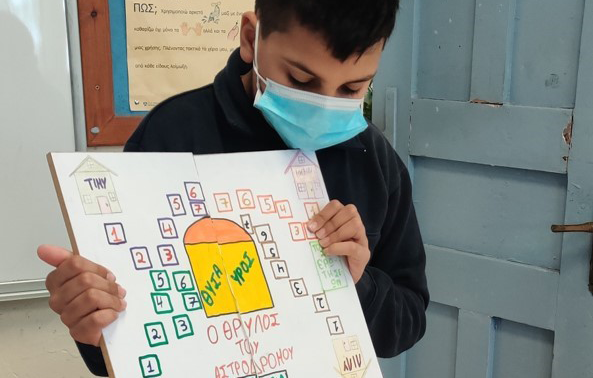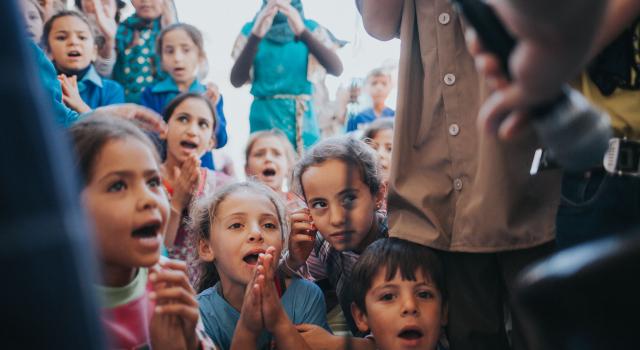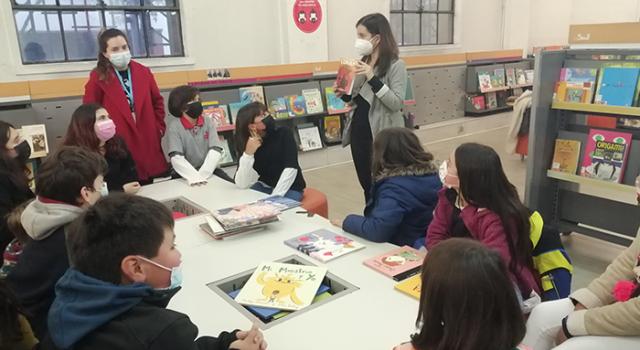IBBY project in the spotlight: 'Literary Games' in Cyprus
How can we encourage reading for pleasure in young people and adults? Many organizations have embarked on innovative projects that have contributed to promoting a reading culture. In this international series, we spotlight reading initiatives from around the world that can inspire reading promoters everywhere. This episode: the Literary Games initiative from Cyprus.
by guest writer Yasmine Motawy
The Cyprus section of IBBY (CyBbY) has long been engaged in vibrant reading promotion activities. Their work shifted online during the pandemic and as soon as the pandemic control measures relaxed, its nine working board members sat down to reassess the situation. They were determined to double their efforts in order to bring books to children who had either lost dear ones during the pandemic, or who were suffering from the psychological toll of long-term confinement. The lockdown had exacerbated a learning crisis and many children in Cyprus, like the rest of the world, had fallen behind. The harmful effects of the pandemic were not equally distributed; children coming from poor families, as well as those who were disadvantaged and vulnerable were the worst hit in spite of the best efforts of the State and individual educators to respond to these new needs.
As Cypriot public libraries ran neither literacy programs for children nor book clubs for young readers during the lockdown, the State Ministry of Education, Culture, Sport, and Youth was happy to support CyBbY in running the ‘Literary Games 2021.’ This brainchild of CyBbY is a modular project funded by the Cultural Services Department of the ministry. The activities ended in October 2022, but following the great success of this first edition, the project is expected to run every two years. We interviewed Charalambos Demetriou, CyBbY board member and coordinator of the ‘Literary Games’, to learn more.
Towards reading for pleasure
Demetriou shares that CyBbY’s work bringing books to children is so important because this generation of children may be closer to its electronic devices than it is to books. Additionally, the occupation of almost half of Cyprus in 1974 resulted in children’s books that were generally focused on representing the political situation and its social implications, well into the 1990s. Until then, teachers “taught” literature rather than approached different aspects of it. It was only in the 2000s that more diverse topics and better quality Cypriot children’s literature became more readily available and that a modern Curriculum for Literature was developed for its public schools. Soon after that, the digital revolution further interfered with reading habits and CyBbY found that it was important for all stakeholders to work harder to make reading pleasurable.
CyBbY’s small volunteer team has developed a vision that promotes books by embedding reading into experiential learning and play, encouraging children to choose their own books, and using ‘social’ reading strategies that foster healthy competition around reading.
Books for healing
COVID restrictions were linked to a significant increase in reported rates of domestic violence, and the increased emergence of psychological problems. Demetriou shares that this was the impetus for CyBbY wanting “to give everyone involved a taste of reading as a playful and healing experience, that helps them to escape when needed, and visit places where they can live a thousand lives.” Dr Katerina Karatasou, Assistant Professor at Frederick University Cyprus and CyBbY Secretary, developed a new framework to encourage analog play, and to encourage children to experiment with a more active form of engagement with digitalism. Karatasou authored the proposal for the initial project and supervised its implementation.
The Literary Games are not CyBbY’s first project that is centered in healing. They run a very successful ongoing Furry Reading Club that encourages children to read in a supportive, creative environment. Trained dogs accompany Cypriot writers to a book reading every Friday after school. These readings are often followed by guided experiential activities based on the book that was read. The silent companionship of a dog as a reading partner offers children the opportunity to work through reading challenges at their own pace, without fear of being judged. Sponsored by the Hellenic Bank in Cyprus, The Furry Reading Club also encourages children with learning difficulties, dyslexia, autism, and reading anxiety to read to the dog, with excellent results.
The Literary Games
The Literary Games' theme in this first edition was … pirates! Pirates on ships, pirates sailing the seas, and pirates landing on deserted islands. The official announcement for the Literary Games was made in October 2021 at the Nicosia Book Fest, with a creative pirate party held on the Kids stage at the festival grounds, “we wanted to change the mood and draw everyone out after almost two very difficult years.” The Literary Games involved a series of experiential workshops and trainings for teachers and children, a national literary board/floor game-making competition, and book presentations.
CyBbY approached Akaki Primary School to be an ambassador school for the Literary Games. The idea was that the results of the project could be cascaded through the school’s pedagogical network and that other schools could personalize and adopt versions of the Literary Games that suited them. “We started by educating the teachers so that they could begin to integrate books on pirates into their curricula and their experiential learning activities. After the initial training, CyBbY supported the school faculty throughout the year with trainings, book recommendations, and follow up meetings both in person and online.”
Firstly, during Greek language classes, the children brought their board games that were in progress, and learned how to use correct rhetoric in order to develop the game’s rules and instructions. Their teachers guided them in finding creative ways to integrate the questions that they came up with about the books that they were reading into classic board games, like snakes and ladders, Monopoly, Trivial Pursuit, and Jenga. Even though developing a board or a floor game was considered an optional activity because CyBbY was concerned that it might be too difficult, it was very well received, “We tried to also engage parents in the games, encouraging them to spend undistracted time with their children. They would work together on creating board games, or on generating questions around books of their choice.”
Podcast BookStops
Students read, researched, discussed, wrote short texts on pirates, and finally created a podcast series about the pirate themed books that they were reading - probably the first such student podcast in Greek. In developing the podcast, the children had to think about how they could speak about books in this specific medium where the books were not visually available to the listener. They learned to describe the physical features of the book itself, introduce the authors, the illustrators, and even the translator, and provide context to the listener. The 6th grade students even developed an outline script for the podcast and shared it with the rest of the school so that all the episodes would have the same pattern. The students collaborated remotely using shared online documents and it was amazing to see the same students that found excuses not to do their homework, had worked hard to find ways to complete their podcasts.
The school also created posters featuring a QR code that transferred those who scanned it to the school’s Spotify channel so that they could listen to the podcast series, titled BookStops. The posters were posted all over the school, inviting passersby to scan and listen. The podcasts were a constructive way to approach mobile technology, and helped to amplify the project outside of the school.
The students impressively managed to release a different episode each week from January 2022 to April 2022. Children in all different grades participated in the activity and the children who wished to contribute to the recordings were allowed to do so regardless of their reading ability or delivery skills. “Many years from now, these students, all grown up, will remember the project every time they log on to the podcast and listen to an episode.”
Supportive partnerships
“CyBbY has limited resources, but we are motivated and empowered mostly by our love for books and children, and work hard to form formal and informal partnerships with entities that are similarly motivated.” The Cyprus Ministry of Education, Sports and Youth helped CyBbY by putting out a formal call inviting all the primary schools run by the ministry to participate in the Games. The Cyprus Pedagogical Institute included CyBbY in its Filanagnosia School Network, allowing them to inform all the schools in the network about the Literary Games. It also allowed Akaki Primary School to interact with the other schools in the network and share the experience of hosting the Literary Games.
One of the main partnerships that CyBbY worked to foster was with the teachers at the Akaki Public Primary School. After two depleting years of hybrid teaching, many were initially resistant to taking on extra work. They would ask “is this really the time for this project?” Once they were convinced that the Literary Games would not mean extra work, but rather, adjusting what they were already doing, “we gradually won them over, and their support enabled the success of the entire project.” Together with CyBbY, the teachers were able to smoothly work the Games’ activities into the school’s yearly action plan.
To reach out to teachers from other schools, teaching at various levels, three experienced teachers, one from each level (kindergarten, primary, and high school) with a special interest in children’s literature, volunteered to develop and coordinate special workshops that presented both theory and praxis. CyBbY also worked with Mythopori, a local group of educators organizing workshops for children in three different cities. They developed and coordinated the workshops for the children and produced documentation on the workshop plans, outcomes, and reflections that would all become part of the publication.
Sandra Eleftheriou, an award-winning local illustrator, donated her time and effort in order to transform CyBbY’s mascot, Kritonio (featured on the left), that she had also initially designed and illustrated, into a pirate so that he could be the mascot for the project.
“The wind beneath our wings was really the people who made our path easy at every turn such as those responsible for the places such as parks, museums, and cultural centers where the training and workshops ran. We could not have done it without the members of CyBbY who offered their talents to help set up a new webpage and online registration, and others who offered art consultations and worked on the planning committee for the game-making competition.” The book mediators spent countless hours before every training and workshop meeting mostly online to finalize the content and smooth out logistical issues such as setting up registration, curating the necessary materials, issuing participation diplomas, etc. Demetriou shares: “We overcame the limited resources we had at our disposal by reaching out to the school’s parents association to provide us with the books that we needed. We coped with the lack of a recording studio in which to record the podcast by showing the teachers how to use their mobile phones to make the recordings. Where there is a will, there truly is a way.”
We were really surprised to see that the project resonated far wider than we had originally planned. Educators, not just book mediators, asked to be involved in the next edition of the Literary Games. We gave presentations to university students studying literacy and to the Cypriot teacher’s association, both were very well received. We even found a piece that appeared both online and in print, in one of the biggest newspapers in Cyprus about the activities going on at the Akaki Primary School, under the headline “Akaki Primary School, A School of Booklovers.” Demetriou was also invited to present the project on national TV on the show Brand News.
Replicability and dissemination
As CyBbY already begins to plan the next themed Literary Games 2023, they reflect on the importance of disseminating information about reading promotion projects. Demitrious shares, “it seems that if we can connect with others around the world that are working on reading promotion, we will not need to “discover” everything by ourselves. We need to find easy ways to share the knowledge and experience we have, and overcome language barriers. Some things function in different ways in different countries but when it comes to reading promotion and filanagnosia [Greek for “the love of reading”], the values and the reactions of people are almost universal.”








